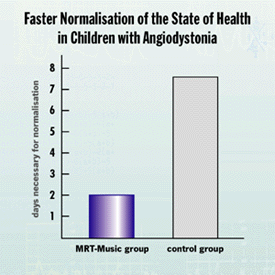We formed two groups
- an experimental group of 51 children who in addition to the conventional therapy were treated for two weeks two times per day with MRT-Music® for 30-60 minutes each, using compact disc and head phones
- a control group of 50 children receiving the conventional treatment only
A positive effect took place already after the first treatment and had stabilized already after 3-4 treatments (2 days). The general state of health improved, breaths per minutes reduced by 1,9 breaths on average, systolic blood pressure reduced by 6.1 mm hg on average, diastolic blood pressure by 4.0 mm hg.
In two patients with symptomatic hypotension no effect was observed. During the whole treatment no negative side effects were recorded.
Here the first improvements of health were recorded after 7-8 days.
Investigators:
Dr. med. J. Komlikow
Dr. med. N. Senowa
Prof. Dr. med. W. Sidorenko
Dr. med. A. Lyschtschik
